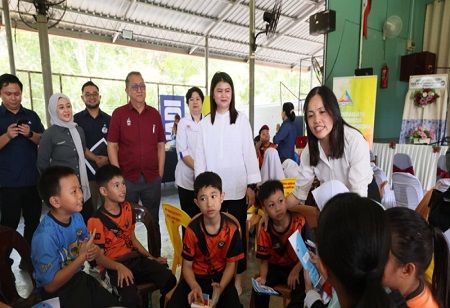- SK Pasir Puteh in Sabah pioneers Safe Internet Campaign (KIS) pilot to teach digital safety to children aged 7-9.
- Programme tackles cyber risks like bullying and grooming, while promoting balanced, responsible, and creative internet use.
- Initiative by MCMC and Communications Ministry aims to build a digitally literate and safety-aware generation across Malaysia.
A school in Keningau, Sabah, has taken a giant leap towards educating children on digital safety with the first of its kind to introduce the Safe Internet Campaign (KIS) module for young children under the Pilot Project. Sekolah Kebangsaan Pasir Puteh was the site of the pilot project, launched by Deputy Communications Minister Teo Nie Ching. The campaign is one of a wider national initiative by the Ministry of Communications and the Malaysian Communications and Multimedia Commission (MCMC) to promote digital literacy and awareness about online safety among children.
120 students from Years 1 to 3, between the ages of 7 and 9, attended the first session of the programme. The module, which is designed to meet the cognitive, social, and developmental needs of young children, covers starting points of internet usage, app behavior, and the dangers of digital spaces. The project addresses the growing earliness of children's exposure to digital technology and teaches safe and responsible online behaviors from the beginning.
Through interactive and child-friendly content, students learned valuable internet safety tips, including the minimum legal age of 13 years to sign up for social media. They were also exposed to urgent cyber risks like cyberbullying, grooming, and other possible dangerous online interactions. All these issues were addressed with sensitivity, with a focus on encouraging children to know how to spot warning signs and when to approach a trusted adult for assistance.
Beyond the risks, the programme also highlighted the benefits of healthy digital behavior. Children were encouraged to balance screen time with offline activities and to use the internet as a tool for learning, creativity, and connection while being cautious and thoughtful users. Organizers hope that early exposure to digital literacy will produce a generation of young Malaysians who are not only technologically literate but also aware of their online personas and safety. Successful deployment of this pilot is expected to open doors for future programs in other schools in Sabah and Malaysia, solidifying the government's agenda for raising digitally responsible youth.

